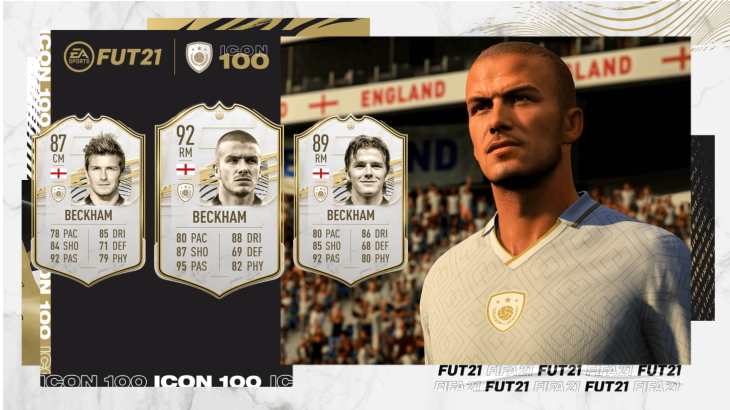
EA Sports employees have been accused of selling FIFA 21 Ultimate Team players, only available through lootboxes and microtransactions.
Dexerto and EuroGamer report that one of their own employees was caught selling untradable FIFA 21 ICONS and Team of the Year players. ICONS are the 100 biggest players in soccer, and therefore are desirable for their stats and status.
On Twitter, pro FIFA player Matteo Ribera and Twitter user Arcade-Fut produced a series of screenshots [1, 2, 3, 4, 5, 6, 7, 8, 9, 10] (Ribera producing a video); allegedly showing ICONS being sold on a “black market” in batches of three for €750 Euros (est. $896 USD).
Other alleged sellers boasted having “a friend from EA,” with one claiming they were selling those in-game items yearly every February and March. They were offering three ICONS for €1,100 Euros ($1,314 USD). The players would be transferred by an EA server bot. ICONS that could be traded would go up to €5,000 Euros ($5,975 USD), but this may have been a tactic to scare off buyers asking for tradeable goods.
While it could be these alleged sellers were lying (one claimed he was a professional Turkish soccer player living in Germany), #EAGate soon trended. EA Sports had previously attempted to deal with FIFA Ultimate Team (FUT) coin and card sellers outside their own market, and the allegation was sure to be damning.
EA Sports released a “pitch notes” regarding the “suspicious activity” after the allegations came to light. They state a “full investigation is underway,” and the alleged behavior was “unacceptable and in no way do we condone granting or purchasing player items in exchange for money. This practice runs counter to the game’s competitive integrity, is a violation of EA’s User Agreement, and is not something we tolerate.”
EA Sports state the “initial investigation shows questionable activity involving a very small number of accounts and items. Although it is not a large number, if these allegations prove out, this activity is unacceptable.”
When the investigation is completed, EA Sports will take action against any employee caught “engaging in this activity,” items sold will be removed, and players who knowingly bought them to be permanently banned.
EA Sports emphasized that sometimes players are granted items directly when they are lost due to technical issues, for the purpose of testing, or “granted on a discretionary basis” to partners.
These partners include “Pro Footballers, celebrity partners, or even our own employees;” and are always set to be be untradeable. The partner items make up “less than 0.0006% of the total player items in the FIFA 21 ecosystem.” As the investigation continues, EA Sports is suspending all discretionary “content granting” indefinitely.
In 2018, the UK Gambling Commission refuted the claim made by some media outlets that lootboxes are akin to gambling. Despite this (or in response to it), in 2019 the UK Digital, Culture, Media and Sport Committee recommended the UK government ban the sale of lootboxes to children, after its nine month inquiry into “immersive and addictive technologies.”
The inquiry involved speaking to industry representatives, including EA and Epic Games. While some felt the proceedings were intentionally badgering, there were blunderous comments made by them.
EA representatives claimed lootboxes were “surprise mechanics,” while an Epic Games representative said they “would disagree with the statement that Epic makes money from people playing the games.“ The UK’s report would later lament that “some representatives” chose to lie, in the committee’s opinion.
In October 2019, EA had filed another patent to encourage microtransactions via creating a “sense of urgency“ as a microtransaction item decreases in “value” over time.
In earlier news, EA face a fine of up to €10 Million EUR over “illegal loot boxes” in FIFA games, after a Dutch court ruled them to be gambling without a licence. EA are also facing a class action lawsuit in Canada over lootboxes across several sports games. These include the Madden NFL series, and EA Sport’s NHL series.
EA are also being sued over the alleged use of patented dynamic difficulty technology to encourage lootbox purchases in EA Sports titles. The suit claims that even players with high stats end up not playing as effectively as they should, and that if EA are using this technology they are not disclosing it.
In the ongoing controversy surrounding lootboxes, several governmental bodies within nations, and their politicians [1, 2, 3, 4] threatened to take legal action against developers.
EA removed premium currency from FIFA 18 and FIFA 19, after Belgium authorities deemed lootboxes as being on-par with gambling. In addition several companies pulled their games from service within Belgium.
While the UK’s National Health Service (NHS) would recommend a ban on games with lootboxes aimed at children in January 2020, UK trade body The Association for UK Interactive Entertainment (UKIE) reiterated many tools and methods are already in place.
In early June 2020, the UK’s Department for Digital, Culture, Media and Sport then called for evidence that lootboxes should be deemed gambling. This later lead to the UK’s House of Lords Select Committee calling on the UK government to “act immediately” and classify lootboxes as gambling.
In late July 2020, a European Union Report recommended tackling lootboxes via new consumer protection regulation, rather than via gambling based ones. Most recently, former EA and EA Sports executive Peter Moore stated in an interview that the Ultimate Team lootboxes are closer to “surprise and delight” than gambling.
Recently, Epic Games announced they would be giving away free virtual currency for Fortnite and Rocket League, after settling a lawsuit over unclear lootbox contents.
Image: EA